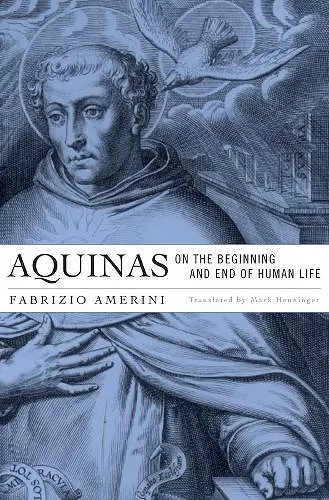Aquinas on the Beginning and End of Human Life
Fabrizio Amerini author Mark Henninger translator
Format:Hardback
Publisher:Harvard University Press
Published:10th Jul '13
Currently unavailable, and unfortunately no date known when it will be back

In contemporary discussions of abortion, both sides argue well-worn positions, particularly concerning the question, When does human life begin? Though often invoked by the Catholic Church for support, Thomas Aquinas in fact held that human life begins after conception, not at the moment of union. But his overall thinking on questions of how humans come into being, and cease to be, is more subtle than either side in this polarized debate imagines. Fabrizio Amerini—an internationally-renowned scholar of medieval philosophy—does justice to Aquinas’ views on these controversial issues.
Some pro-life proponents hold that Aquinas’ position is simply due to faulty biological knowledge, and if he knew what we know today about embryology, he would agree that human life begins at conception. Others argue that nothing Aquinas could learn from modern biology would have changed his mind. Amerini follows the twists and turns of Aquinas’ thinking to reach a nuanced and detailed solution in the final chapters that will unsettle familiar assumptions and arguments.
Systematically examining all the pertinent texts and placing each in historical context, Amerini provides an accurate reconstruction of Aquinas’ account of the beginning and end of human life and assesses its bioethical implications for today. This major contribution is available to an English-speaking audience through translation by Mark Henninger, himself a noted scholar of medieval philosophy.
Erudite, thoughtful, [and] carefully translated… Amerini exposes the ‘tensions’ and ‘vacillations’ in Aquinas’s abstruse accounts of human embryogenesis. But their main point is clear: the inseminating male initiates a process that, while it leads to the conception of a pre-human uterine animal, does not actually generate another human being. -- Denis J. M. Bradley * America *
What makes the book, I think, a fascinating read, is Amerini’s detailed analysis of texts that Thomas wrote throughout his career, showing how his thoughts on the topic evolved and were refined. In that sense, I think anyone interested in history, especially the history of philosophy and science, would be fascinated at this look inside the world of a medieval philosopher on one very particular topic. -- John Farrell * Forbes *
Because Aquinas’s teachings are authoritative for Catholic theology, this volume by Amerini explores Aquinas’s account of life’s beginning and end. The author notes Aquinas’s inconsistency and changing views. He argues that the Thomistic account does not allow one to claim that an embryo is a human being at the moment of conception, since Aquinas believes humans require faculties of will and reason. Still, scholars need to look at contemporary scientific accounts of growth and development to see how they may or may not harmonize with specific teachings. Students of theology and bioethics will find this study elucidating, especially since it shows the promise and pitfalls of attempting to use classical theological sources to construct positions for contemporary Christian ethics. Students interested in Thomistic thought, theological bioethics, and Catholic moral theology will find this closely argued work worthwhile and illuminating reading. -- A. W. Klink * Choice *
This is a first-rate treatment of a complex topic. Fabrizio Amerini carefully and clearly explains how Aquinas deals philosophically with the topic of human generation and how what he says might be connected with certain questions raised today in discussions of bioethics. His treatment of Aquinas is exhaustive and admirably documented. It should serve as an authoritative corrective to ways in which Aquinas has sometimes been invoked in arguments concerning the start of human life. It also amounts to a fine introduction to some of Aquinas’s key metaphysical ideas. -- Brian Davies, Fordham University
Amerini’s book is a masterful treatment of the much-discussed discrepancy between the teachings of the Catholic Church on abortion and the teachings of its leading theological champion. Combining philosophical insight with scholarly precision, Amerini carefully works through all aspects of Aquinas’s view: metaphysical, biological, and ethical. In a field where previous treatments have often been marred by bias and animus, Amerini offers a model of evenhanded analysis. Neither of the entrenched parties to this ongoing dispute will feel completely satisfied by Amerini’s conclusions, but all sides will learn a great deal from his meticulous discussion. -- Robert Pasnau, University of Colorado
Aquinas on the Beginning and End of Human Life shows how rigorous historical research can be useful in discussing hot topics of current bioethics. Written with great accuracy and attention to historical texts, Amerini’s book stresses the mistakes of many contemporary readings of Aquinas and clarifies implications for the current debate on abortion and euthanasia. This book is one of the best attempts to hold together the accurate historical reconstruction of one of the most influential thinkers of Western philosophy with the theoretical implications for the contemporary bioethical discussion on abortion and euthanasia. -- Sergio Filippo Magni, University of Pavia
ISBN: 9780674072473
Dimensions: unknown
Weight: unknown
288 pages